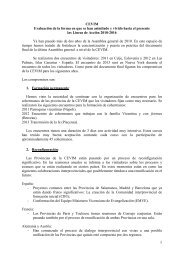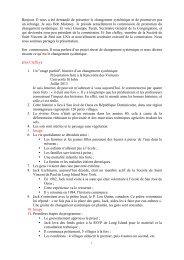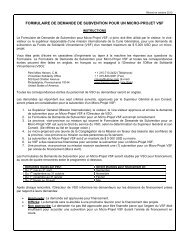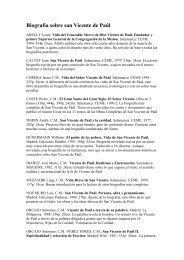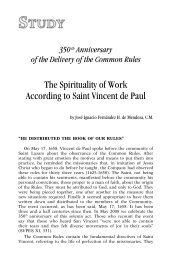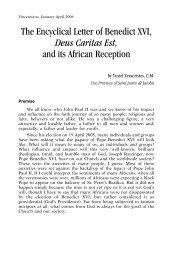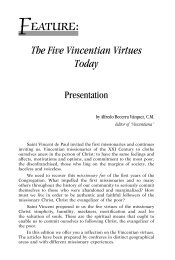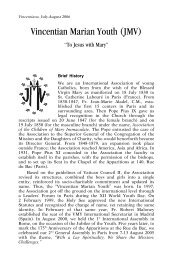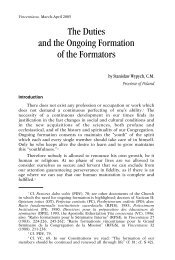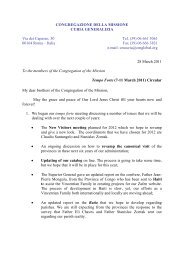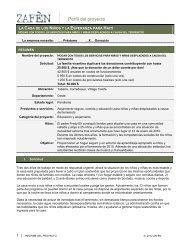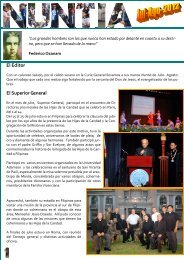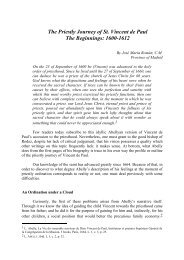Ongoing Formation of Religious - CMGlobal
Ongoing Formation of Religious - CMGlobal
Ongoing Formation of Religious - CMGlobal
Create successful ePaper yourself
Turn your PDF publications into a flip-book with our unique Google optimized e-Paper software.
VINCENTIANA 1/2-2008 - INGLESEApril 17, 2008 − 4ª BOZZA96 Cyril de Souzareality these three aspects are shared by many others. We willnow examine these three emphases and, eventually, we will try tosynthesize them in order to build up our understanding <strong>of</strong> ongoingreligious formation as a preventive means to <strong>of</strong>fset the crisis invocations.4.1. The Process <strong>of</strong> BecomingPaul Griéger’s understanding <strong>of</strong> ongoing formation grew in thecontext <strong>of</strong> secular formation. In that context he observes that anindividual is not to be regarded as a static being, nor even as onewhose acquired abilities and strengths deteriorate or decline. Hebelieves that the individual in response to the educative stimuli is ina process <strong>of</strong> evolution and development <strong>of</strong> personal strengths, whichcomprise physical, psychic and spiritual components. Hence,essentially the human person lives a life <strong>of</strong> growth, <strong>of</strong> developmentand <strong>of</strong> maturation. 10There is a driving force within every human being to movetowards becoming a mature adult and a responsible person, and thisis complemented in the pr<strong>of</strong>essional objective that every educatorhas. In this process <strong>of</strong> growth towards maturity in education, as wellas in formation, there are four stages through which the individualhas to pass, because they comprise the fourfold stages in the process<strong>of</strong> education or formation: knowing (sapere), knowing how to do(saper fare), knowing how to be (saper essere) and knowing how tobecome (saper diventare). In order to enter into the dynamics <strong>of</strong>ongoing formation it is imperative that the individual supersede thesimple desire to learn (imparare a imparare), which is characteristic<strong>of</strong> initial formation, and should nurture the desire to learn to become(imparare a divenire). 11The human being from birth to death never stops becoming andbeing guided. The desire to strive for perfection pushes one toconstantly become better and to be more qualified, and this is a veryimportant characteristic for a healthy and feasible process in ongoingformation. In order to respond to these personal characteristics, theprocess <strong>of</strong> ongoing religious formation and those responsible toprovide occasions for such a formation should guarantee the10Cf. P. GRIÉGER, “La formazione permanente problema nuovo per gliIstituti religiosi,” in COLLECTION, La formazione permanente nella vita religiosa.XII Convegno “Claretianum” (Editrice Rogate: Rome 1987), p. 12.11Cf. P. GRIÉGER, “La formazione permanente negli istituti religiosi.Organizzazione pedagogica,” in Vita consecrata 18 (1982) 3, p. 197.



